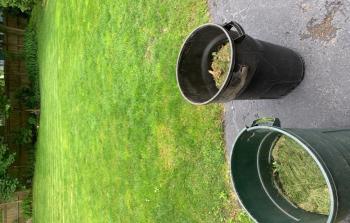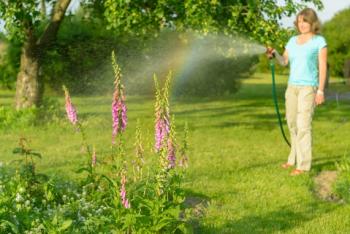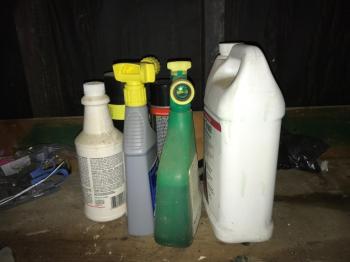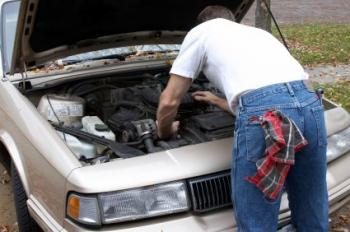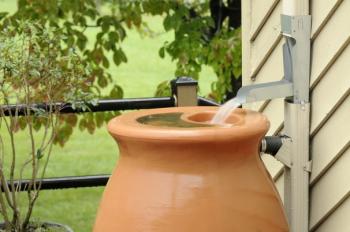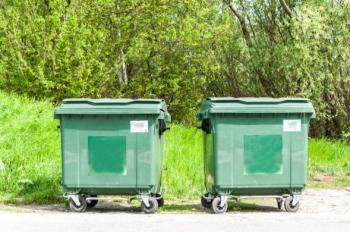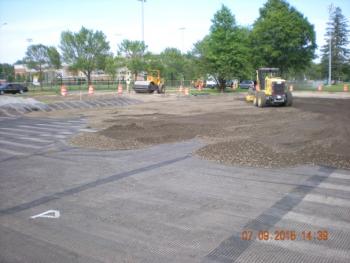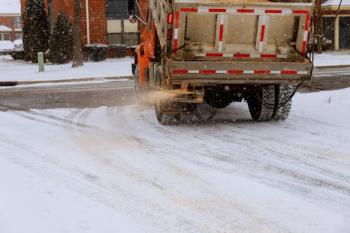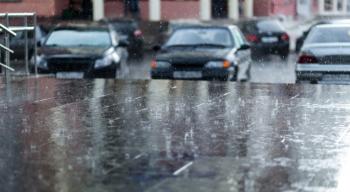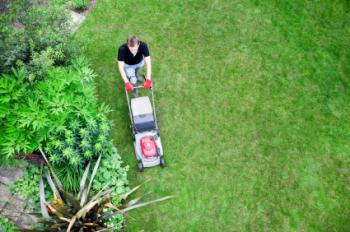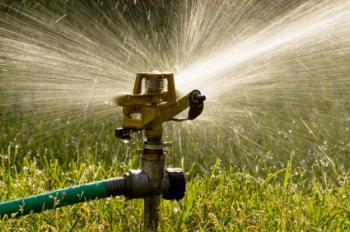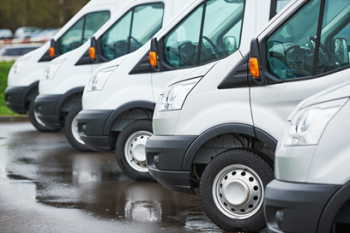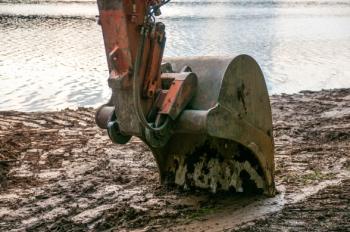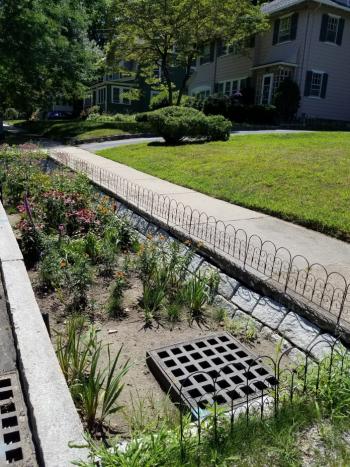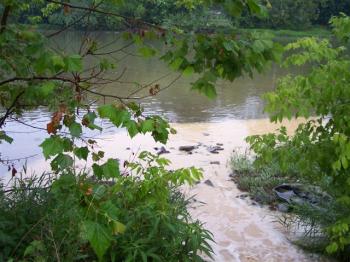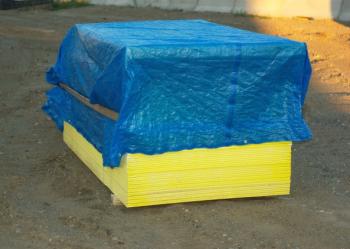Keep Our Waterways Clean
Leaves and grass clippings that are dumped or stored near waterways or paved areas add to water pollution and clog storm drains causing flooding.
Here is what you can do about it:
- Place raked leaves or lawn clippings in paper bags to be collected by the town.
- Consider composting yard waste.
- Keep paved areas and storm drains clear of leaves.
- Keep bagged, piled and mulched leaves on natural soil, a few feet back from paved areas.
- Ensure that your lawn service is properly disposing of yard waste.
- Reduce excessive lawn chemical use and always follow manufacturer’s directions.
Las hojas y los recortes de césped que se tiran o almacenan cerca de vías fluviales o áreas pavimentadas se suman a la contaminación del agua y obstruyen los desagües pluviales causando inundaciones.
Esto es lo que puede hacer al respecto:
- Coloque las hojas rastrilladas o los recortes de césped en bolsas de papel para que la ciudad los
- recoja.
- Considere la posibilidad de compostar los desechos del jardín.
- Mantenga las áreas pavimentadas y los desagües pluviales libres de hojas.
- Mantenga las hojas empaquetadas, apiladas y con mantillo en suelo natural, a unos pocos pies de
- las áreas pavimentadas.
- Asegúrese de que su servicio de jardinería esté eliminando correctamente los desechos del jardín.
- Reduzca el uso excesivo de productos químicos para el césped y siga siempre las instrucciones del
- fabricante.
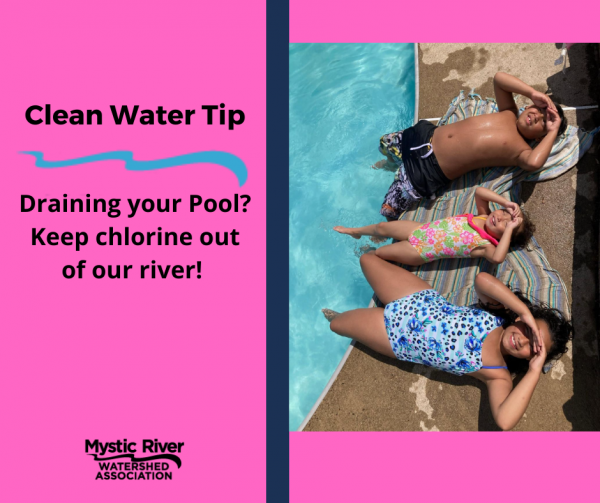
Be sure not to drain chlorinated water into the storm drain, or it will end up in our rivers, lakes, and streams! Instead, wait for chlorine levels to drop before discharging slowly onto your lawn. (Pool water should be close to neutral (pH 6.5-8.5), and chlorine less than 0.01 mg/L).
Protect Clean Water, Wildlife, Pollinators and YOU: Avoid Pesticides!
Clean Water Tip Punta de Agua Limpia
___________________________________________________________________________________________________
What is Stormwater Pollution? Water that falls from the sky or melts from snow carries polluting chemicals back to our ponds, streams, and parks
.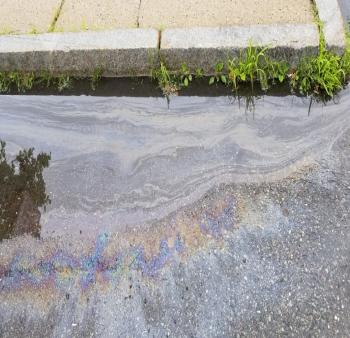
Why do we care? The chemicals and trash carried by stormwater contaminates the waters of our city, and in turn is harmful to the people of Melrose and the wildlife living here.
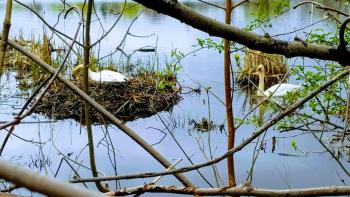
What can we do? Everyone from business owners to residents in Melrose can prevent the pollution of our city in a few simple ways given at the bottom this webpage.
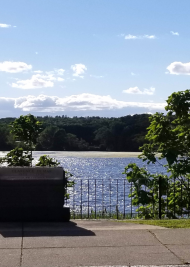
Doesn’t stormwater get treatment? One of the MOST important things to understand about stormwater is that it is not mixed with sanitary sewer water (wastewater). Wastewater travels from our homes or businesses to a treatment plant, but stormwater drains directly back to our own city’s land and water, including Ell Pond. Most stormwater pollution does not receive any treatment and flows directly back to our city’s waters!
Sewer
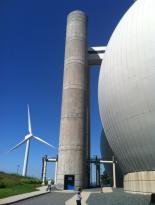 Wastewater travels to Deer Island (pictured here) to remove pollution.
Wastewater travels to Deer Island (pictured here) to remove pollution.
Versus Drainage
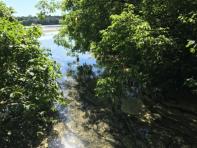
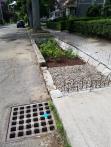 Stormwater carried any pollution directly back to bodies of water such as Ell Pond
Stormwater carried any pollution directly back to bodies of water such as Ell Pond
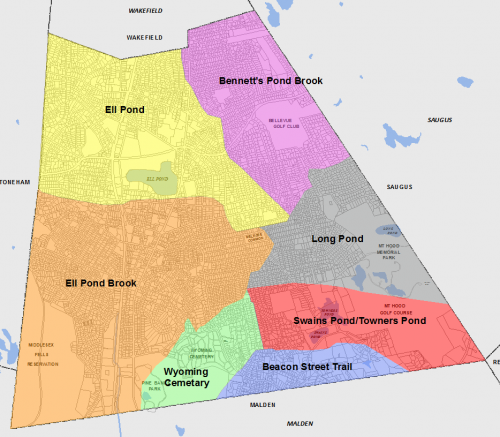

What Residents Can Do
We need every resident to do their part to reach our goal of clean healthy waterways. The following tips will help you prevent stormwater pollution from your home.
Pet Waste Belongs in the Trash!
Yard Waste
Lawn Chemicals and Fertilizer
Lawn Watering
Household Chemicals
Car Care
Soak Up the Rain!
What Businesses Can Do
Businesses, institutions, churches, and hospitals can all do their part to keep Massachusetts' waterways clean. See below for tips to prevent stormwater pollution from your parking lots, grounds, and operations.
Waste and Material Storage
If rain falls into your dumpsters or on your raw materials, then it's carrying some of that stuff with it as it drains away. A little good housekeeping and a few sheds or tin roofs can take care of that problem. Property managers should inspect dumpsters regularly and only store chemicals outside with tight-fitting lids. For more tips like these, check out this handy brochure from the Bureau of Water Supply Protection at the Massachusetts Department of Conservation and Recreation.
Parking Lots
Businesses, churches, hospitals, and other institutions can do a lot to reduce polluted runoff from their parking lots. One solution is to replace asphalt with modern "permeable" pavements that allow rain and melting snow to soak in rather than run off. Another is to design parking lots to drain into rain gardens, infiltration basins, filter strips, and stormwater ponds, rather than directly into the storm sewer system. You can learn more about these techniques by reading this fact sheet from the Pioneer Valley Planning Commission.
Snow and Ice Removal
When businesses, churches, and hospitals use road salt and de-icers, melting snow carries those chemicals into waterways. Businesses should store these chemicals carefully and apply them sparingly. When purchasing, read the labels on de-icing products and choose those that are not toxic to animals and plants. The Massachusetts Department of Environmental Protection has some guidelines on where and how businesses and local governments should store road salt, to protect our waterways.
Outdoor Cleaning
Grounds crews should sweep sidewalks, loading docks, and parking lots and dispose of the trash and debris in the dumpster, rather than washing these areas with a hose. If outdoor washing is necessary, look for environmentally friendly, water-based cleaning products. Maintenance crews should rinse paint cans, brushes, buckets, or other cleaning materials in an indoor sink. For a great example of operational procedures, check out the Town of Sudbury's Clean Water Best Practices manual.
Landscaping Chemicals and Fertilizer
Groundskeepers should test soil and read the label before applying fertilizer. If they use too much fertilizer, the excess will just wash away in the next rain, polluting local waterways. Use fertilizers sparingly and sweep up driveways, sidewalks, and walkways. Fertilizer may not even be necessary! According to experts, many businesses over-fertilize their landscaping. The University of Massachusetts has a handy guide for testing soil to determine if it can absorb any more nutrients.
Irrigation
Most businesses only need to water their landscaping once a week. It's smart to put sprinklers on timers so they water early in the morning, and point them so that they don’t water the sidewalk or driveways. If your businesses has stormwater ponds, cisterns, or rain barrels that capture rain before it leaves your property, using that water on your landscaping often makes a lot of sense. The Metropolitan Area Planning Council includes a chapter about business reuse of water in its guide Once is Not Enough: A Guide to Water Reuse in Massachusetts
Fleet Care
Many institutions maintain fleets of trucks, buses, ambulances, and other vehicles on site. Do this carefully to keep gasoline, oil, and soap suds out of storm drains and waterways. Vehicle maintenance should be done indoors, using drop cloths and drip pans. If there is a spill, clean it up promptly using absorbent sand and kitty litter. The Massachusetts Office of Energy and Environmental Affairs has published guidelines on fleet maintenance for municipal governments. It's good advice for businesses, churches, hospitals, and other institutions, too!
https://www.thinkbluemassachusetts.org/for-businesses
What Developers Can Do
Stormwater pollution often begins at construction sites, but it doesn't have to. See below for tips that developers can take to keep Massachusetts waterways clean.
Get Your Permit
Many kinds of construction sites are required by federal law to take steps to prevent stormwater pollution -- and permit requirements in Massachusetts are changing. Check with the Melrose Conservation Commission before you disturb the soil. Learn more about the stormwater permits from the U.S. Environmental Protection Agency. See also Massachusetts Stormwater Handbook & Stormwater Standards for more practices to manage stormwater on your site.
Low Impact Development Practices
Low Impact Development (LID) practices protect and use the land’s natural features as a way to filter and slow the flow of stormwater. These practices manage stormwater at its source and protect natural areas, too. They can also save developers money by minimizing the need to add infrastructure like streets and gutters. Examples of LID practices include:
- Permeable pavement, such as pavers and crushed stone, can be used in place of asphalt and concrete to pave surfaces. These materials allow rain and snow to soak into the ground instead of flowing into storm drains. They are often used for parking lots, driveways, and sidewalks.
- Bioretention areas (also known as rain gardens) are shallow depressions in the landscape that collect water that runs off from hard surfaces. These areas are planted with grasses and flowering plants that help filter the water as it soaks into the ground. They are often placed in parking lot islands or street medians.
- Vegetated filter strips are broad, gently sloping areas of grass or plants that trap, filter, and slow stormwater runoff. They are often located by roads, parking lots, and driveways.
You can learn more about LID practices in this Massachusetts Low Impact Development Toolkit.
Pre-Construction Planning
A little planning ahead of time can go a long way to prevent stormwater pollution. Begin by choosing your site carefully. Place storage and maintenance areas far away from storm drains and waterways. Make sure that everyone working on-site knows their roles in carrying out your Stormwater Pollution Prevention Plan, if you are required to have one. For more useful tips, see General Construction and Site Supervision Stormwater Tips, published by the Massachusetts Department of Conservation and Recreation.
Erosion & Sediment Control
It’s important that you pick a combination of erosion and sediment controls that work for your site. This includes practices that protect natural landscape features, like streams and wetlands, and stabilize soil. You will also need to put practices in place to protect and maintain silt fences, storm drain inlets, and construction entrances.
Site Maintenance
A little good housekeeping can keep polluted runoff from ending up in nearby waterways. Sweep often, keep dumpsters covered, and remove trash daily. Store construction materials under a tarp or a plastic sheet to protect them from rain and snow. Clean up small spills immediately using absorbent materials, like sand. More cleaning and maintenance tips can be found in General Construction and Site Supervision Stormwater Tips, published by the Massachusetts Department of Conservation and Recreation.
https://www.thinkbluemassachusetts.org/for-construction
Thank you for visiting the City of Melrose’s Stormwater outreach website. If you have any further questions, please contact us in the Engineering Division at 781-979-4172.


